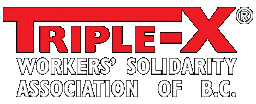 |
|
PrEP: Pre-Exposure Prophylaxis
Definition: Pre-Exposure Prophylaxis, or "PrEP," is the idea that a person could take a pill once a day and be protected from catching HIV, not unlike the birth-control pill which protects from unwanted pregnancy.

PrEP/PEP
Poster: The Stigma Project, 2014 |
PrEP is an emerging ARV-based HIV prevention technology. Research trials have shown that Truvada when taken daily is effective as prophylaxis. Sex workers and others engaged in commercial transactions involving sex have been identified as an at-risk population in need of PrEP to reduce HIV infection rates, particularly in countries where HIV rates are high. Internationally, sex workers in most countries have no mechanism to provide direct input into public health policies or programs for implementing PrEP in the sex workplace. This is also true in Canada.
Contents
What's New?
Listing last updated: April 11, 2016.
- "Serious Kidney Problems Are Rare With PrEP, but Increase With Older Age and Better Adherence." Project Inform, The Body Pro, April 5, 2016
"In terms of clinically significant kidney function declines, however, age played a huge part. About a quarter of those over 50 had a clinically significant decline, compared with 5% in those under 40, even when the younger cohort had very high adherence…"
- "A Pill a Day to Prevent HIV," Bar Hostess Empowerment and Support Programme (BHESP), April 4, 2016
"BHESP Oral PrEP Project Officer Mercy Wafula says the pilot one-year PrEP project targets 600 female sex workers in Nairobi and currently 200 are using prep while 378 have been screened for eligibility and are awaiting results…"
- "Is sub-Saharan Africa ready for pre-exposure prophylaxis?" Adeline Bernier, et al, The Lancet, April 2016
"If we want to reduce HIV incidence, there is an urgent need to scale up such community-based sexual health centres that provide free, unlimited, and high-quality services to key populations in non-discriminatory settings. PrEP will not be a revolution in itself without the availability of high-quality prevention services tailored to the needs of key populations…"
- Pre-Exposure Prophylaxis (PrEP) for People Who Inject Drugs: Community Voices on Pros, Cons and Concerns. International Network of People Who Use Drugs, March 18, 2016
"Participants in the consultation expressed concern that PrEP may become mandatory for people who use drugs or that people who use drugs will be coerced to take it."
- "A case of HIV transmission on PrEP and its implications Health advocate says high cost still main barrier to access." CATIE News, March 15, 2016
"Key details about this important case and its possible implications for HIV risk reduction in the future … Although this is the first well-documented case of HIV transmission in someone who is highly adherent to Truvada as PrEP, it is not the first case of such a transmission."
- "One pill a day to keep HIV at bay for thousands of sex workers." Laura Lopez Gonzalez, Health-E News: The South African Health News Service, March 11, 2016
"Today the National Health Department and the South African National AIDS Council (SANAC) are expected to announce that at least 3,000 HIV-negative sex workers will be eligible to begin taking the combination antiretroviral (ARV) Truvada as pre-exposure prophylaxis (PrEP) to prevent contracting HIV."
- "First Man To Contract HIV While On Daily PrEP Speaks Out: 'I Stopped Using Condoms'." Staff, The Gaily Grind, March 3, 2016
"I stopped using condoms after going on PrEP. I was such as big proponent of PrEP that if I was chatting with someone on a hookup site who wanted to use condoms, it was a deal-breaker for me."
- "Pre-exposure prophylaxis of HIV: A right way to go or a long way to go?" Wenya Yu, et al, Artificial Cells, Nanomedicine, and Biotechnology, February 2016
"A systematic literature search identified 143 eligible articles of which only 5 reported complete findings while another 11 were still on-going. … To prevent potential cultural and behavioral modifications, proper pre-administration counseling also seemed critical for the success of PrEP as a cost-effective intervention with adequate coverage…"
- "HIV Infection Despite PrEP: 6 Things You Need to Know." JD Davids, Queer Voices, Huffington Post, February 29, 2016
"Very rarely, PrEP with FTC/TDF [emtricitabine/tenofovir, Truvada] may fail to provide full protection against rare multidrug resistant viruses," said noted PrEP and HIV prevention researcher Robert Grant in an interview with BETA…"
- "Did Health Canada Just Approve Truvada as PreP? Health advocate says high cost still main barrier to access." Niko Bell, Xtra!, February 27, 2016
"Truvada is indicated in combination with safer sex practices for PrEP to reduce the risk of sexually acquired HIV-1 infection in adults at high risk."
- "Long-acting PrEP injection tolerable and acceptable for male volunteers, but dose adjustment needed: Most subjects experienced injection-site pain, but still preferred injections to pills." Gus Cairns, AIDSMAP, February 25, 2016
- "TAF/emtricitabine maintains viral suppression as well as TDF regimens with less bone and kidney toxicity." Liz Highleyman, AIDSMAP, February 25, 2016
- "Almost-certain case of PrEP failure due to drug resistance reported at CROI 2016." Gus Cairns, AIDSMAP, February 25, 2016
- "HIV-1 Infection With Multi-class Resistance Despite Preexposure Prophylaxis (PrEP)." David C. Knox et al Abstract No: 169aLB, Conference on Retroviruses and Opportunistic Infections, February 22-25, 2016, Boston, Massachusetts
- "Two Large Studies Show IPM's Monthly Vaginal Ring Helps Protect Women Against HIV." International Partnership for Microbicides, February 22, 2016
"First long-acting HIV prevention method for women reduced infections by approximately 30% overall, with differences in efficacy by age and level of use; IPM to seek regulatory approval for investigational product…"
- On the Fast-Track to end AIDS: UNAIDS 2016-2021 Strategy. UNAIDS, 2016
"Target No. 6: 90% of key populations including sex workers, men who have sex with men, people who inject drugs, transgender people and prisoners, as well as migrants, have access to HIV combination prevention services."
- Examining the Implications of PrEP medication as HIV Prevention for Sex Workers. Cheryl Overs, Institute for Development Studies, February 4, 2016
- "HIV PrEP drug Truvada as safe as aspirin, study finds," Stephen Feller, United Press International, January, 20, 2016
"An analysis of five studies involving more than 15,000 people showed a small number of minor side effects, researchers reported. Doctors, researchers, and experts are pushing for wider use of PrEP, sold as Truvada, and for it to be available over the counter…"
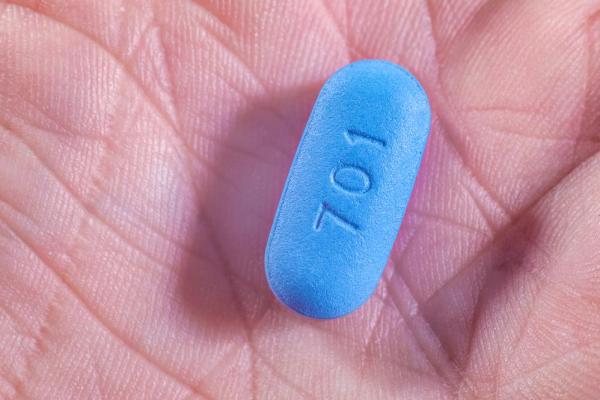
Truvada: Safe as Aspirin
Photo: Marc Bruxelle/Shutterstock |
|> Contents |
PrEP in the Context of Sex Work
"PreP in the Context of Sex Work: Possibilities and Limitations" is a national sex-worker group consultation to learn about, discuss and make recommendations regarding the use of PrEP in the sex workplace setting. The project has so far received three separate grants in support of this work: a $15,000 planning grant from the Canadian Institutes for Health Research (CIHR) for a pre-consultation planning meeting; $75,000 from the Elton John AIDS Foundation (EJAF) for the national consultation; and separate from these, a $33,000 CIHR Catalyst Grant to create an online survey to investigate these issues further. This is the first EJAF grant ever awarded for a national community consultation with sex-worker organizations to discuss pre-exposure prophylaxis (PrEP) in the sex industry workplace.
Project Goals
The proposed project aims to:
- educate and empower sex workers through community dialogue, debate and advocacy with regard to PrEP in the context of sex work;
- mobilize communities of sex workers by providing opportunity to come together to discuss the possibilities and limitations of PrEP within their communities;
- train sex work communities to better understand clinical, behavioural and implementation aspects of PrEP;
- engage sex work communities in local and national dialogue to help ensure that efforts to roll-out and scale-up PrEP activities can be better informed by a range of community-based voices, including those of sex workers.
Project Description
The project will:
- build the knowledge and capacity of sex workers and advocates in the science, implementation and bioethics of PrEP for more meaningful involvement in setting PrEP implementation recommendations and identifying PrEP research gaps;
- facilitate communication and networking among sex workers, advocates, and experts in PrEP;
- create a community-based portal for networking and the exchange of information pertaining to PrEP in the context of sex work in Canada;
- organize and conduct a community-based consultation among sex workers, advocates, and experts in PrEP;
- develop recommendations for the implementation and scale up of PrEP-related activities for female, male and transgender sex workers and their clients and partners in Canada;
- enable a lobbying mechanism to help to ensure that future PrEP-related activities within the context of sex work occur within a rights-based framework.

Traitement préventif contre le VIH |
Background
In May 2015, Andrew Sorfleet, president of Triple-X came across a petition for the use of Truvada as pre-exposure prophylaxis on Facebook. Along with the petition was a factsheet which made reference to a set of Guidelines for PrEP from the B.C. Centre for Excellence in HIV/AIDS research. These guidelines recommended prescription of PrEP for persons at risk of HIV which included those involved in commercial sex.
There has been discussion about the implications of the introduction of PrEP in the sex workplace. Particularly, there are concerns that the introduction of PrEP would add new pressures to not use condoms from clients and employers in a competitive market. It is obvious that sex workers must be involved in any determination to implement PrEP in the workplace, and that sex workers in British Columbia have not been consulted. There are also concerns about the possible side effects of Truvada, particularly since there is little information about long-term use of the medication as PrEP.
In response to a plea for help, Dan Allman and Cheryl Overs offered to assist. With Dan's help, Triple-X partnered with the Dalla Lana School of Public Health and we began submitting grant applications to hold a national sex-worker group consultation in Canada to examine the possibilities and implications of PrEP for sex workers.
References
- Global Consultation: PrEP and Early Treatment as HIV Prevention Strategies. Network of Sex Work Projects, August 2015
"NSWP recognises, in line with the diverse opinions of sex workers across the world, that there is a place for biomedical interventions in the global fight to end HIV. However, these will fail if implemented at the expense of supporting and empowering sex workers and other key populations to take ownership of their health needs, related policies and programmes, and they are not implemented within a rights-based framework. Sex workers must be fully engaged in this growing debate."
- PrEP: Pre-Exposure Prophylaxis, Fact Sheet, Health Initiative for Men, Vancouver 2015
- Gilead: Please ask Health Canada to approve Truvada for PrEP, Health Initiative for Men, May 2015.
- Combination HIV prevention for female sex workers: what is the evidence? Linda-Gail Bekker, Leigh Johnson, Frances Cowan, Cheryl Overs, Donela Besada, Sharon Hillier, Willard Cates Jr,The Lancet, July 2014
- Truvada as PrEP: What You Should Know Before Making the Decision, March 13, 2014
- Briefing Paper No 4: New Prevention Technologies and their Implications for Sex Workers. Network of Sex Work Projects, c. 2014
- "The tide cannot be turned without us: sex workers and the global response to HIV." Cheryl Overs and Bebe Loff, Journal of the International AIDS Society, 2013
- You Can't Turn the Tide Without Us, (transcript) Cheryl Overs, Plenary: Dynamics of the Epidemic in Context, XIX International AIDS Conference, Washington, DC, July 26, 2012
- Sex Work and the New Era of HIV Prevention and Care. Cheryl Overs, Asia Pacific Network of Sex Workers, c. 2011
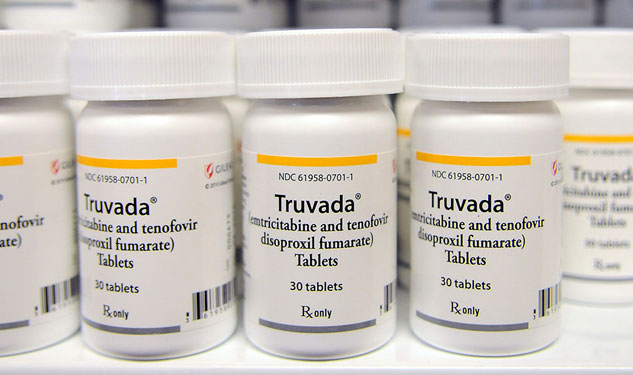
Truvada® (emtricitabine and tenofovir disoproxil fumarate) Tablets |
|> Contents |
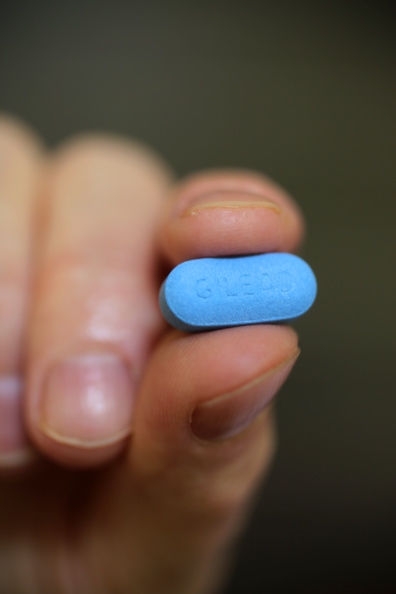
Truvada by Gilead
Photo: Getty Images |
A Little About Pre-Exposure Prophylaxis
In December 2010, the New England Journal of Medicine published findings from the Gilead sponsored iPrEx trial examining the effectiveness of HIV pre-exposure prophylaxis (PrEP) in gay men and other men who have sex with men. The study ultimately showed that HIV was successfully prevented in up to 92% of cases in men who were adherent to a daily dose of Truvada. Similar results were demonstrated in the subsequent PROUD trial from the UK and IPERGAY in France and Canada.
In July 2012, research showing the success of Truvada as PrEP was conclusive, and a new era of HIV prevention was celebrated at the International AIDS Conference in Washington, DC. "Turning the Tide Together" was the theme. The U.S. Food and Drug Administration approved the use of Truvada for prevention of HIV in the United States.
Released at the 2014 International AIDS Conference, The iPrEx OLE study was the first demonstration project on the experience of those using pre-exposure prophylaxis (PrEP). "We had been concerned that people taking PrEP might stop using condoms or have more sexual partners, but we did not see any evidence of risk compensation," said Dr Robert Grant, Protocol Chair and Senior Investigator. The iPrEx OLE study included 1,603 men and transgender women who were offered PrEP for 72 weeks, and was conducted in cities in Peru, Brazil, the U.S., South Africa and Thailand.
A study released in 2015 reports that after 2.5 years, a group of more than 600 San Francisco men who have sex with men (MSM) taking Truvada as PrEP have had zero cases of HIV contraction. The study also found that many of these individuals are using condoms less and more than half of those in the group study had contracted at least one sexually transmitted infection (STI) within a year.
When you access PrEP through a demonstration project, you get tested for HIV every three months. You are also be asked to report any incidents which may have posed a risk for HIV exposure (such as sex without condoms, etc.) for research purposes. This research also helps determine if use of PrEP has an affect on increase or decrease in risky behaviour.
Before Truvada was approved by Health Canada for use as pre-exposure prophylaxis for HIV, some doctors prescribed Truvada for that purpose known as "off-label use." Informal reports suggest off-label use of PrEP is occurring among sex workers in Canada, with some sex workers advertising their own use of PrEP as a contextual component of the services they offer. Health Canada approved Truvada for use as PrEP in February.
Truvada is but one of many PrEP medications available or in development. Global Advocacy for HIV Prevention (AVAC) provides a monthly chart which shows all the drugs being researched, the ARV-based Prevention Pipeline.
References
- "Did Health Canada Just Approve Truvada as PreP? Health advocate says high cost still main barrier to access" Niko Bell, Xtra!, February 27, 2016
"Truvada is indicated in combination with safer sex practices for PrEP to reduce the risk of sexually acquired HIV-1 infection in adults at high risk."
- "Long-acting PrEP injection tolerable and acceptable for male volunteers, but dose adjustment needed: Most subjects experienced injection-site pain, but still preferred injections to pills." Gus Cairns, AIDSMAP, February 25, 2016
- "Two Large Studies Show IPM's Monthly Vaginal Ring Helps Protect Women Against HIV." International Partnership for Microbicides, February 22, 2016
"First long-acting HIV prevention method for women reduced infections by approximately 30% overall, with differences in efficacy by age and level of use; IPM to seek regulatory approval for investigational product…"
- "PrEP Version 1.1, 2.0, and Beyond: The treatment to prevent HIV infections faces inaccurate comparisons to other meds and the same fearful objections as 'the pill' did in the '60s." Peter Staley, The Advocate, January 7, 2015
- "Truvada 2.0." National Association of People with HIV Australia, June 16, 2015
"Gilead has applied to the US Food and Drug Administration for approval of a new version of Truvada. The upgraded compound replaces tenofovir disoproxil fumarate (TDF) with tenofovir alafenamide (TAF). As already mentioned, TAF has a more favourable side-effect profile than TDF."
- "2.5 Years Later, Zero Cases Of HIV In Large San Francisco PrEP Group." Instinct Magazine, September 2, 2015
- "Virtually No Risk and Less Stress on PrEP." James Findlay, Gay News Network, July 29, 2014
- "FDA approves first drug for reducing the risk of sexually acquired HIV infection: Evidence-based approach enhances existing prevention strategies." FDA News Release, July 16, 2012

ARV-Based Prevention Pipeline
Credit: Global Advocacy for HIV Prevention |
|> Contents |
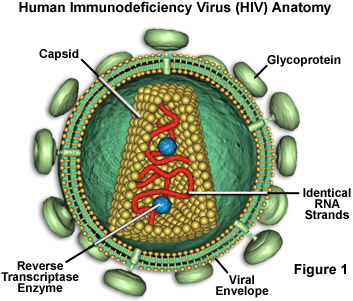
Human Immunodeficiency Virus (HIV) anatomy
Photo: National High Magnetic Field Laboratory |
HIV Treatment and ARV Mechanics
Viruses are not alive. They are complex organic chemicals (either DNA or RNA, usually enclosed within a protein coat) that are like cell parasites.
HIV is called a "retrovirus." A retrovirus's genetic material is in the form of RNA. HIV infects white blood cells by copying its genetic code into the cell's DNA. The infected cell then creates new copies of HIV which eventually exit the cell into the bloodstream infecting more blood cells. However, in order for HIV to infect a cell, it must first convert its genetic material from RNA into DNA. This process requires an enzyme called "reverse transcriptase."
Enzymes are very specific both in function and in chemical structure. Enzyme inhibitors are substances that interfere with amino acids and interrupt the structure of the enzyme. This alters the catalytic action of the enzyme and consequently slows down, or in some cases, stops catalysis. This makes enzyme inhibitors toxic. Herbicides and microbicides are chemical enzyme inhibitors.
The basic building blocks of DNA and RNA (nucleic acids) are called "Nucleotides." One of the main ingredients in Truvada is called Tenofovir. Tenofovir belongs to a class of drugs called Nucleotide Reverse Transcriptase Inhibitors. The first Reverse Transcriptase Inhibitor (RTI) called Zidovudine (also known as AZT) was approved for treatment of HIV in 1987.
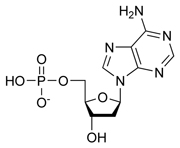
Nucleotide constituent of DNA
Illustration: Wikipedia |
RTIs or NRTIs are Nucleotide or Nucleoside analogues — faulty (chain-blocker) versions of Nucleotides. (a Nucleoside becomes a Nucleotide once a phosphate group is added to the molecule.) When the reverse transcriptase enzyme binds with these faulty building blocks, HIV's DNA chain-building is halted, and it does not get incorporated in the healthy cell's DNA. This in turn slows HIV infection, eventually to the point of zero viral load in the blood. The chain-blocking affect of the the faulty Nucleotides can also affect DNA synthesis in your host cells. This is the reason for the drugs' toxicity side effects.
Unfortunately prolonged exposure to RTIs can cause HIV to mutate into strains which are resistant to the drugs. These strains compensate by removing or not using the faulty Nucleotide analogs to complete DNA synthesis. For this reason combinations of RTIs are used (sometimes referred to as "the cocktail.") Truvada is the combination of Tenofovir disoproxil fumarate and Emtricitabine. There is speculation that long-term use of NRTIs could eventually fail to prevent infection by a resistant form of HIV that would not respond to current ARV drug treatment.
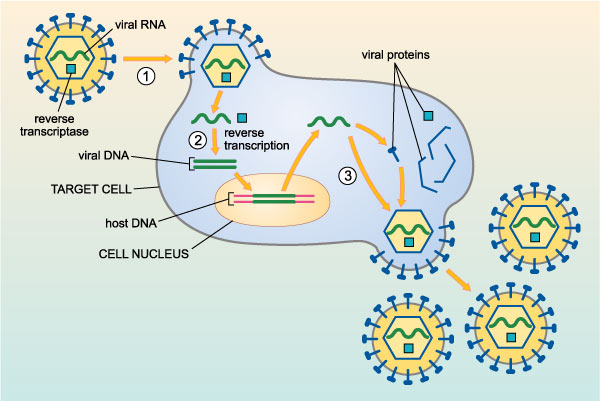
Life cycle of HIV. Illustration: The Open University |
References
- "Nucleoside/Nucleotide Reverse Transcriptase Inhibitors (NRTIs). POZ.com
- HIV/AIDS: How Everyone Benefits From Undetectable Viral Load, (5.28 minutes) Youreka Science/San Francisco AIDS Foundation, March 2, 2015
- Demystifying HIV Pre-Exposure Prophylaxis, (4.42 minutes) Youreka Science/San Francisco AIDS Foundation, March 19, 2014
- What is PrEP? (Includes video with illustration on how it works inside the body to prevent HIV.)
- "HIV-1 Infection With Multi-class Resistance Despite Preexposure Prophylaxis (PrEP)." David C. Knox et al Abstract No: 169aLB, Conference on Retroviruses and Opportunistic Infections, February 22-25, 2016, Boston, Massachusetts
- "Resistance To HIV Medication Alarmingly Widespread," IFL Science, January 29, 2016
- "Study: HIV can hide and grow in 'sanctuaries' in body after it's undetectable in blood," Washington Post, January 27, 2016
- The CUREiculum, Global Advocacy for HIV Prevention (AVAC), 2016
The CUREiculum is a suite of tools that provides simple, accessible information on HIV cure research, organizing into a systematic format for ongoing or issue-specific learning. The CUREiculum was developed in a multi-collaboratory process by leading scientists, community educators and various advocacy organizations who recognized the need for increasing literacy in this exciting arena. The tools are designed for community educators, funders, media and other stakeholders. Fifteen key areas of HIV cure research have been developed into free standing modules…
- "Rapid HIV treatment points to possible 'functional cure' for some patients." Kate Kelland, The Globe and Mail, March 15, 2013
- "Enzymes Make the World Go 'Round." Rader's Chem4Kids!
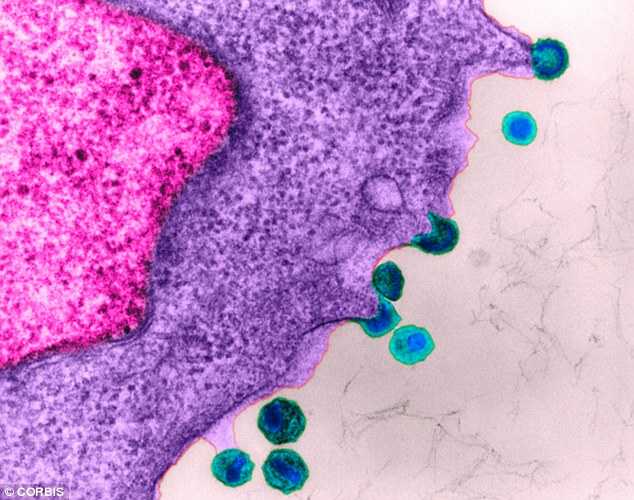
HIV. Photo: Corbis |
|> Contents |
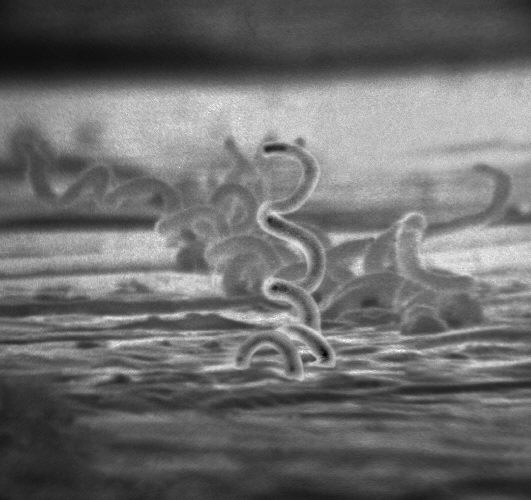
Electron micrograph of Treponema pallidum
Image: Public Health Image Library, U.S. CDC |
PrEP and Sexually Transmitted Diseases
PrEP (Truvada) is proven in research studies to protect against HIV only. PrEP does not provide protection from other sexually transmitted infections. One of the main concerns raised about the possibility that PrEP might be used as a replacement for condoms is the potential rise in infection rates of other sexually transmitted diseases. The rate of new sexually-transmitted infections (STIs) has been increasing — sometimes sharply — since about 2000. In particular, syphilis — including the diagnosis of later stages — has been cause for some alarm. Treponema pallidum is the causative agent of syphilis. In the United States, over 35,600 cases of syphilis were reported by health officials in 1999.
For PrEP research trials, one measurement of success is the diagnosis of other sexually-transmitted diseases. Sexually transmitted infections are evidence that there was risk for HIV. In the San Francisco study, Kaiser Permanente reported that at 12 months, 50% of PrEP users had been diagnosed with any STI (33% had a rectal STI, 33% had chlamydia, 28% had gonorrhea, and 5.5% had syphilis).
Research has shown that syphilis infections, both in primary and secondary stages, decrease CD4 counts and increase HIV viral load in patients on HAART (as well as patients who are not). Research also suggests that syphilis infection accelerates HIV replication. Treatment failure for late-stage syphilis in patients who are HIV-positive is well documented.
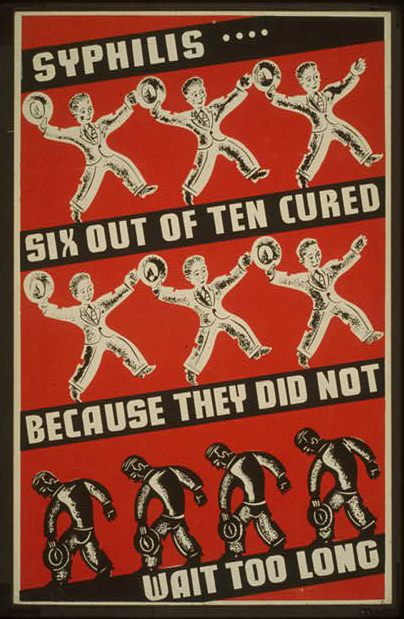
Six Out of Ten Cured
Poster: Work Projects Administration, New York, 1941 |
References
- "HIV Incidence Among Men Who Have Sex With Men After Diagnosis With Sexually Transmitted Infections." David A. Katz, PhD, MPH, et al, Sexually Transmitted Diseases, April 2016
"These findings highlight the potential value of using specific STIs to target resource-intensive interventions such as PrEP, but suggest how such a highly targeted approach might have limited direct population-level impact. … This population-based study supports conclusions from previous studies in clinical and research settings that MSM with rectal infections and early syphilis are at extremely high risk for subsequently acquiring HIV, although our absolute risk estimates are lower than those previously reported."
- "Sexually transmitted infections and pre-exposure prophylaxis: challenges and opportunities among men who have sex with men in the US." Hyman M. Scott and Jeffrey D. Klausner, AIDS Research and Therapy, (Creative Commons), 2016
- "NHS urged to allow patients daily pill which could save millions by dramatically reducing the risk of contracting HIV." Lizzy Parry, Daily Mail Online, September 8, 2015
- STI Annual Surveillance Reports, B.C. Centre for Disease Control, 1997-2014
- Infectious Syphilis Among Gay, Bisexual and Other Men Who Have Sex with Men in British Columbia 2003 to 2012, B.C. Center for Disease Control, June 2013
- "He who knows syphilis knows medicine – the return of an old friend." Michael Rayment, Ann K Sullivan, The British Journal of Cardiology, Vol. 18 Iss. 2, April 2011
The UK has seen an explosion in venereal syphilis in the first decade of the 21st century. There were
3,762 diagnoses of early stage 'infectious syphilis' (comprising primary, secondary and early latent syphilis) made in 2007, more than in any other year since 1950. The trend has continued unabated with a similar figure seen in 2008 (2009 data are awaited). Between 1997 and 2007, annual diagnoses of infectious syphilis rose more than 1,200%…
- "Treatment of syphilis in HIV-infected subjects: a systematic review of the literature." British Medical Journal, Leah J Blank, et al, July 2010
- "Impact of Syphilis Infection on HIV Viral Load and CD4 Cell Counts in HIV-Infected Patients." Rosario Palacios, MD, PhD, et al, Journal of Acquired Immune Deficiency Syndrome, March 1, 2007
"The fact that more than one half of our patients were on HAART may have limited the degree of the impact of syphilis on CD4 cell levels. Nevertheless, we observed that CD4 cell counts decreased in HIV patients on HAART and in those not on HAART…"
- The Great Pretender Comes to Ward 86: Syphilis cases from HIV/AIDS clinic. Mark Jacobson MD, UCFC, San Francisco, December 2005
- "Syphilis increases HIV viral load and decreases CD4 cell counts in HIV-infected patients with new syphilis infections." Kate Buchacz, AIDS, 2004
"Syphilis infection, particularly the generalized stage of secondary syphilis, may increase the immune activation of host cells, affect the secretion of cytokines including TNF-α, and upregulate transcription factors such as nuclear factor kappa beta to alter cell cycles, and thus enhance HIV replication…"
- "The Role of Sexually Transmitted Diseases in HIV Transmission." Shannon R. Galvin and Myron S. Cohen, Microbiology, Reviews, Nature, January 2004
"In communities that were receiving STD intervention, an STD reference clinic, enhanced training and supervision of medical staff, a regular supply of drugs and community health education were all available. Six pair-matched comparison communities received standard care. The incidence of HIV was reduced by 40% in the communities receiving enhanced STD care…"

BBC History Cold Case: Crossbones Girl. BBC broadcast May 27, 2010
A fascinating investigation into the identity and cause of death of a skeleton from Crossbones Cemetery. Provides incredible insight into syphilis and prostitution in Victorian London. |
|> Contents |

#TruvadaWhore
Photo: Adam Zebowski |
PrEP and Whore Stigma
It started with an article in the Huffington Post titled, "Truvada Whores?" which suggested that the U.S. Federal Drug Administration was encouraging bareback sex. The article stated that it was appropriate to prescribe Truvada for committed discordant couples, sex workers and drug addicts, "but for gay men who just like bareback sex, Truvada is just an excuse to do what they want." The AIDS Healthcare Foundation (AHF) launched a national advertising campaign against the widespread use of Truvada as PrEP, with a similar moral bent. Michael Weinstein, AHF's president and co-founder, told Buzzfeed, Truvada was a "party drug," and that its strongest advocates "have all been associated with bareback porn."
Adam Zebowski, an HIV test counsellor at San Francisco AIDS Foundation, took offence. He considered this to be "slut-shaming," not unlike the way most doctors of the 1960s refused to prescribe birth-control pills for unmarried women. Zebowski decided to appropriate the term, "Truvada Whore" and began selling T-shirts to raise funds for AIDS organizations. Zebowski's social media campaign went viral.
In March 2013, a U.S. CDC released a report finding that only one in six gay men used condoms consistently for anal sex and that 100 per cent condom use for anal sex is only 70 per cent effective in stopping HIV. The CDC study also stated that intermittent use of condoms has no effect on reducing HIV rates.

"I am On Truvada, But I am Not a Whore." Graphic: HIV= |
References
- "Press council rule complaint not upheld." Gay Express, July 8, 2015
Pornstar, Blue Bailey has his formal complaint against Gay Express dismissed. The complaint was lodged against a story about New Zealand AIDS Foundation denouncing the visiting "bareback pornstar."
- "Op-ed: I am On Truvada, But I am Not a Whore," Ronnie Carroll, HIV Equal Online, April 29, 2015
- "What If You're Wrong About PrEP?" Adam Zeboski, #TruvadaWhore, January 20,2015
- "HIV prevention drug Truvada focus of controversy: The drug Truvada is increasingly being used as PrEP, to prevent HIV transmission. But some gay activists worry there will be negative fallout." Paul Hunter, Toronto Star, November 23, 2014
- "'Truvada Whore' Stigma Endures Among Doctors and LGBTs: Despite the green light from the CDC and WHO, the stigma against using HIV prevention medication continues in both the LGBT and medical communities." Jim Burress of Wabe, The Advocate, August 11, 2014
- "Why I Am a Truvada Whore: I've been taking PrEP for over six months, and have urged many friends to follow suit – sadly too late for some." Christopher Glazek, OUT Magazine, May 20, 2014
- "Advocating Pill, U.S. Signals Shift to Prevent AIDS." Donald G. McNeil, New York Times, May 14, 2014
- "HIV Testing Counselor Sells 'Truvada Whore' Shirts For AIDS Charity." Daniel Villarreal, Towerroad, March 21, 2014
- "Consistent condom use in anal sex stops 70% of HIV infections, study finds: Only one-in-six men reported 100% condom use during three to four years of follow-up." Gus Cairns, NAM AIDSMAP, March 4, 2013
- "Truvada Whores?" David Duran, Huffington Post, November 12, 2012
"Truvada is just an excuse to do what they want."

Truvada Whore cartoon
Cartoon: Ranslem, Washington Blade |
|> Contents |
History of Biomedical Prophylaxis Research on Sex Workers
Gilead pharmaceutical studies with sex workers in Cambodia to determine the effectiveness of the HIV treatment, Viread (Tenofovir, also a main ingredient in Truvada) as PrEP were halted in August 2004. The local sex workers union stopped the study demanding decades of free health care as compensation for participants becoming HIV-positive during the study. As well, there were Tenofovir trials with sex workers in Cameroon which were likewise halted in 2005.
Medical research into preventing sexually-transmitted diseases on sex workers has a long history with serious ethical violations. For example, in April 2015 800 plaintiffs launched a $1 billion lawsuit against John Hopkins University for deliberately infecting prisoners, mental patients and orphans in Guatemala from 1945 to 1956. These medical experiments also involved infecting prostitutes and then providing them for sex to subjects for intentional transmission of the disease. These experiments were to determine the prophylactic efficacy of penicillin for syphilis and gonnorhoea.
Due to the high cost of Truvada medication (approximately $900 USD/month), programs to supplement patients' costs for the drugs usually involve on-going participation in research trials that involve routine testing, counselling and interviews.
References
- "Guatemalans deliberately infected with STDs sue Johns Hopkins University for $1bn: Lawsuit with 800 plaintiffs seeks damages for individuals, spouses and children of people deliberately infected with STDs through US government programme", The Guardian, April 2, 2015
- "Guatemala victims of US syphilis study still haunted by the 'devil's experiment': Survivors tell of damaged lives after being deliberately infected in secret 1940s experiment on 1,500 men, women and children." Rory Carroll, The Guardian, June 8, 2011
- Preventing Prevention Trial Failures: A Case Study and Lessons for Future Trials from the 2004 Tenofovir Trial in Cambodia. Anna Forbes and Sanushka Mudaliar, Global Campaign for Microbicides, 2009
- Research Rashomon: Lessons from the Cameroon Pre-exposure Prophylaxis Trial Site. Elizabeth McGrory, Andrea Irvin and Lori Heise, Global Campaign for Microbicides, 2009
- Tenofovir Trial in Cambodia (Sex Workers Resist). Created by Asia Pacific Network of Sex Workers (APNSW) c. 2007. Features protests by APNSW and Women's Network for Unity (WNU) (Cambodia) among many more.
Watch the video: vimeo.com/155192982
- "The Trouble with Tenofovir," Stuart Rennie, Global Bioethics Blog, August 12, 2005
- The Abandoned Trials of Pre-Exposure Prophylaxis for HIV: What Went Wrong? Jerome A Singh, Edward J Mills. July 19, 2005 (DOI: 10.1371/journal.pmed.0020234)
- "Unethical clinical trials in Thailand: a community response." Letters, The Lancet, May 2005
- "The trials of Tenofovir Trials." Editorial, The Lancet, March 2005
- International Ethical Guidelines for Biomedical Research Involving Human Subjects. Council for International Organizations of Medical Sciences (CIOMS) in collaboration with the World Health Organization (WHO), Geneva 2002
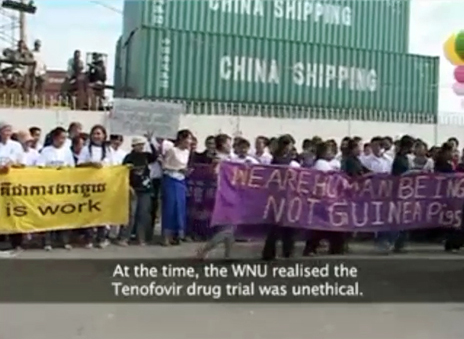
Video: Tenofovir Trials in Cambodia
Women's Network for Unity & Asia Pacific Network of Sex Workers |
|> Contents |
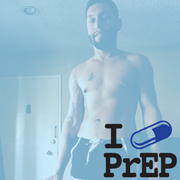
"Boyfriend for rent"
Image: Twitter, 2015 |
HIV Prevention Regulation and Sex Work
Pre-exposure prophylaxis in the context of the sex industry workplace is not simply about Truvada or even other once-a-day treatments. How PrEP is introduced to sex workers can set precedents for future HIV-prevention technologies. It opens larger questions about HIV prevention in the workplace, which include condom-use legislation, HIV testing sites within the workplace, periodic presumptive treatment and even vaccinations. These questions are complex when considered in the context of labour and human rights.
There have been attempts in the past of public health regulation for sex workers, in the form of enforced condom use and mandatory routine HIV and STI testing. For example, by 2003 100% Condom-Use Programs (100% CUP) were being implemented or planned in several countries in Asia, Latin America and Africa. UNAIDS and other key agencies promoted 100% CUP as a "best practice" as a result of claims made about the role of 100% CUP in reducing national HIV epidemics.

Sex-worker rights perspective on 100% condom-use programmes
Photo: Carol Jenkins, July 2002 |
References
- "California Officials Vote Against Condom Rules for Porn Productions." Rhett Pardon, XBiz News Report, February 18, 2016
"Nearly all of the adult entertainment stakeholders said that if S. 5193.1 were to come into play, it would force the business underground and might put an end to the industry's own requirement that actors be tested for sexually transmitted disease every 14 days."
- "Global Burden of HIV among Men Who Engage in Transactional Sex: A Systematic Review and Meta-Analysis." Catherine E. Oldenburg, et al, PLOS One, July 2014.
- "Burden of HIV among female sex workers in low-income and middle-income countries: a systematic review and meta-analysis." Stefan Baral, et al, Lancet Infectious Diseases, March 15, 2012
- "Periodic presumptive treatment of curable sexually transmitted infections among sex workers: recent experience with implementation." Richard Steen, et al, Co-Infectious Diseases, February 2012
- The Report of the UNAIDS Advisory Group on HIV and Sex Work, UNAIDS and Global Network of Sex Work Projects, December 2011
"Some countries and sub-national jurisdictions have decriminalised sex work, removing all penal code violations related to sex work, sometimes also establishing health regulations or other non-penal code regulatory frameworks for sex work. These include Germany, the Netherlands, Senegal, New Zealand, parts of Australia, and some counties in the US state of Nevada."
- Periodic presumptive treatment for sexually transmitted infections: Experience from the field and recommendations for research. Department of Reproductive Health and Research, World Health Organization, 2008
"In this case, periodic presumptive treatment was provided — in the absence of regular STI services — for sex workers in three provinces. Rates of gonococcal and chlamydial infections fell significantly during the intervention. The findings suggested that there is a good rationale for administering periodic presumptive treatment (as was done in this case) in situations where the prevalence of STIs is high and where STI services are lacking…"
- Worker Health and Safety in the Adult Film Industry: Post-Hearing Report. Paul Koretz, Chair, California State Assembly Committee on Labor and Employment, July 2004
"Dr. Coates further testified that in addition to a harm reduction strategy policy makers and the industry should also be re-conceptualizing the issue of safety in adult films to include "combination prevention" as may be necessary in order to control transmission of HIV during the risky situations that define the content of adult films."
- "HIV Transmission in the Adult Film Industry – Los Angeles, California, 2004." Morbidity and Mortality Weekly Report, September 23, 2005
"In April 2004, the Los Angeles County Department of Health Services (LACDHS) received reports of work-related exposure to human immunodeficiency virus (HIV) in the heterosexual segment of the adult film industry in California. This report summarizes an investigation by LACDHS into four work-related HIV-transmission cases among adult film industry workers."
- "HIV and STI Testing and Treatment Policies." Section 9: Sex workers and clients must adopt safer sex practices, Prostitution Reform Act 2003, Reprint July 1, 2013
"A person must not provide or receive commercial sexual services unless he or she has taken all reasonable steps to ensure a prophylactic sheath or other appropriate barrier is used if those services involve vaginal, anal, or oral penetration or another activity with a similar or greater risk of acquiring or transmitting sexually transmissible infections."
- "Cambodia's 100% Condom-Use Program." 100% CUP Draft Report, December 23, 2002
"The policy framework for the Cambodian 100% CUP is contained in the following Ministry of Health documents: Strategy and Guidelines for Implementation of 100% Condom Use in Cambodia; Policy for HIV/AIDS and STI Prevention and Care in the Health Sector in Cambodia; Guidelines for the Implementation of STI Services, Policy, Strategy and Guidelines for HIV/AIDS Counseling and Testing; and The Outreach Program: Strategy and Guidelines for Implementation."
- "Sex worker rights perspective on 100% condom-use programmes." AIDS 2002 Barcelona, ACT UP New York, July, 2002
"According to Carole Jenkins, HIV Advisor to USAID, 'the bottom line is that affected and vulnerable communities have to have a voice in the design, implementation, monitoring and evaluation of programmes. Practically speaking, when/if someone accuses a programme of abuse or misconduct, the only safeguard you have is the real and democratic participation of the affected communities.'"
- "AIDS vaccine trials set to start in Kenya." Canadian Broadcasting Corp., December 20, 2000
"The vaccine was developed from research on a group of prostitutes working in a Nairobi slum. The sex workers in the Majengo area never contracted HIV, despite being repeatedly exposed to infection."
- Ethical Considerations in HIV Preventive Vaccine Research UNAIDS Guidance Document. UNAIDS, May 2000
"Guidance Point 5: To ensure the ethical and scientific quality of proposed research, its relevance to the affected community, and its acceptance by the affected community, community representatives should be involved in an early and sustained manner in the design, development, implementation, and distribution of results of HIV vaccine research."
- "Acceptability of HIV Vaccine Trials in High-Risk Heterosexual Cohorts in Mumbasa, Kenya." Denis J. Jackson, et al. AIDS, 1995
"A significant minority anticipated an increase in risk behavior, which emphasizes the need for intensive counseling and education throughout a vaccine trial."
|> Contents |
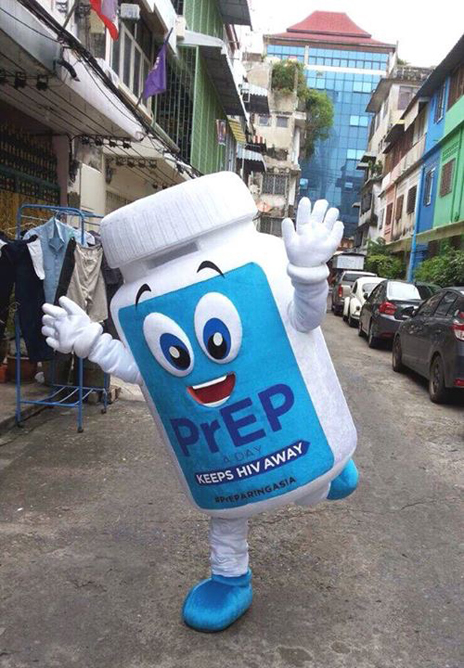
PrEParing Asia
Photo: APCOM, Bangkok, 2015 |
PrEP and Sex Work
- "One pill a day to keep HIV at bay for thousands of sex workers." Laura Lopez Gonzalez, Health-E News: The South African Health News Service, March 11, 2016
"Today the National Health Department and the South African National AIDS Council (SANAC) are expected to announce that at least 3,000 HIV-negative sex workers will be eligible to begin taking the combination antiretroviral (ARV) Truvada as pre-exposure prophylaxis (PrEP) to prevent contracting HIV."
- "AIDS preventive medicine available for sex workers in Sonagachi from December." News Agencies, Catch News, November 10, 2015
- Global Consultation: PrEP and Early Treatment as HIV Prevention Strategies. Network of Sex Work Projects, August 2015
"NSWP recognises, in line with the diverse opinions of sex workers across the world, that there is a place for biomedical interventions in the global fight to end HIV. However, these will fail if implemented at the expense of supporting and empowering sex workers and other key populations to take ownership of their health needs, related policies and programmes, and they are not implemented within a rights-based framework. Sex workers must be fully engaged in this growing debate."
- "Why Isn't a Revolutionary HIV Medication Getting to Sex Workers?" Caelainn Hogan, VICE Magazine, August, 2015
- Biomedical Prevention of HIV and Sex Workers. HIV Australia, Vol. 13 No. 2, July 2015.
Cameron Cox, Joel Falcon and Gemma Keegan outline sex workers' concerns about the potential for coercive approaches to biomedical prevention.
- PrEP Trials Underway In Australia, Despite Concern From Sex Workers. Network of Sex Work Prejects, December 18, 2014
- "PrEP: What It Is and How Sex Workers Can Use It." Lindsay Roth, Tits and Sass, October 22, 2014
- Key Issues: Sex Worker Policy Issues in Australia. Scarlet Alliance National Forum, 2014
- Sex Worker Pre-conference AIDS 2014 Consensus Statement. July 18-19, 2014
- Sex-Worker Community Experiences and Perspectives. Treatment as Prevention: PrEP and early initiation of treatment, Sex-Worker Consultation, Thailand, May 2, 2014
- Pre-Exposure Prophylaxis (PrEP) and Early Treatment. (Survey of 33 sex workers), Scarlet Alliance, May 2014
- "Sex workers using anti-HIV drugs instead of condoms." Zainab Deen, Nairobi, BBC World Service, November 21, 2013
- PrEP and Sex Work Reference List, Dan Allman and Cheryl Overs
|> Contents |
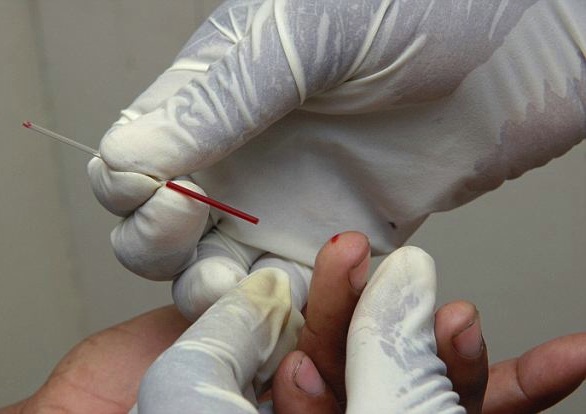
Rapid tests analyze finger-prick blood samples
Photo: Daily Mail Online |
Sex Work, HIV and Prevention
- "Building Solidarity to Overcome Invisibility: Sex Workers and HIV-Focused Activism: Even as federal agencies and public health organizations have taken steps to address HIV in vulnerable populations, sex workers have been left out of the conversation." Anna Forbes, Rewire, March 10, 2016
- HIV and STI Testing and Treatment Policies. Global Network of Sex Work Projects, February 2016
- HIV and STI Testing and Treatment Policies: Briefing Paper. Global Network of Sex Work Projects, December 2015
- Sex Work in Canada: The Public Health Perspective. Canadian Public Health Association, December 2014
- "Global Burden of HIV among Men Who Engage in Transactional Sex: A Systematic Review and Meta- Analysis." Catherine E. Oldenburg, et al, PLOS One, July 2014
- Stepping Up the Evidence on HIV and Sex Work: Decriminalise Sex Work Now, Sex Workers at AIDS 2014, Scarlet Alliance, 2014
- "Special Theme Issue on HIV and Sex Workers at AIDS 2014," The Lancet, July 22, 2014
- "Global epidemiology of HIV among female sex workers: influence of structural determinants." Kate Shannon et al, The Lancet, July 22, 2014
- Briefing Paper No 4: New Prevention Technologies and their Implications for Sex Workers. Network of Sex Work Projects, c. 2014
- "The tide cannot be turned without us: sex workers and the global response to HIV." Cheryl Overs and Bebe Loff, Journal of the International AIDS Society, 2013
- The Smart Sex Worker's Guide to SWIT. Global Network of Sex Work Projects, Bridging the Gaps, 2013
Provides a short summary of the key points in Implementing Comprehensive HIV/STI Programmes with Sex Workers also known as Sex Worker Implementation Tool (SWIT).
- Implementing Comprehensive HIV/STI Programmes with Sex Workers: Practical Aproaches from Collaborative Interventions. World Health Organization, United Nations Population Fund, Joint United Nations Programme on HIV/AIDS, Global Network of Sex Work Projects, The World Bank, 2013
- HIV and Sex Work. Issue 13, Research for Sex Work Global Network of Sex Work Projects, December 2012
- You Can't Turn the Tide Without Us, (transcript) Cheryl Overs, Plenary: Dynamics of the Epidemic in Context, XIX International AIDS Conference, Washington, DC, July 26, 2012
- Prevention and Treatment of HIV and other Sexually Transmitted Infections for Sex Workers in Low- and Middle-income Countries: Recommendations for a public health approach. World Health Organization, United Nations Population Fund, UNAIDS, Global Network of Sex Work Projects, December 2012
- Prevention and Treatment of HIV and Other Sexually Transmitted Infections for Sex Workers in Low- and Middle-Income Countries: Policy Brief. HIV/AIDS Programme, World Health Organization, December 2012
- Rapid Response: Sex Worker HIV Risk. Ontario HIV Treatment Network, July 2012
- Female, Male and Transgender Sex Workers' Perspectives on HIV & STI Prevention and Treatment Services: A Global Sex Worker Consultation. Global Network of Sex Work Projects, October 2011
- Sex Work and the New Era of HIV Prevention and Care. Cheryl Overs, Asia Pacific Network of Sex Workers, c. 2011
|> Contents |

Reaching Common Ground on PrEP
Poster: AIDS Health Foundation |
Guidelines and Policies for PrEP
|> Contents |

Sex Workers and HIV-Focused Activism
Photo: Shutterstock |
PrEP/HIV Care Resources for Women
- PrEP for Women. The Well Project, August 5, 2015
- "PrEP appears safe for use in conception, but may not be necessary if partner is taking treatment." Roger Pebody, AIDSMAP, July 4, 2014
- "Improving Health Outcomes for IPV-Exposed Women Living with HIV." Gina M. Wingood, ScD, Journal of Acquired Immune Deficiency Syndrome, September 1, 2013
"Findings from this study corroborate existing empirical data demonstrating that exposure to Intimate Partner Violence (IPV) may increase risk for HIV transmission, perhaps as a consequence of poor mental health, illicit substance use, riskier sexual practices or history of incarceration. … Trauma-informed care is an approach to that recognizes the presence of trauma symptoms and acknowledges the role that trauma plays in in people's lives. Trauma-informed care may be indicated precisely because the study observed that women who experienced IPV found it more difficult to remain engaged in HIV care."
- "Caring for women living with HIV: gaps in the evidence." Mona R Loutfy, et al, Journal of the International AIDS Society, 2013
- Meeting Report: Expanding HIV Prevention Options for Women – A Satellite Session at IAS 2013, Kuala Lumpur, Malaysia 30 June 2013. International AIDS Society Industry Liaison Forum
- "Will and Should Women in the U.S. Use PrEP? Findings from a Focus Group Study of At-risk HIV-negative Women in Oakland, Memphis, San Diego, and Washington, DC." Judith D. Auerbach, et al, AIDS United, XIX International AIDS Conference July 27, 2012
- "Pre-exposure Prophylaxis for the Prevention of HIV Transmission to Women in the United States." Erika Aaron and Deborah Cohan, AIDS 2012
- "Comments to the FDA's Antiviral Drugs Advisory Committee Meeting." Erika Aaron, CRNP, Drexel University College of Medicine,Division of Infectious Diseases and HIV Medicine, May 10, 2012
"I do represent a network of clinicians offering comprehensive reproductive health care to women in various settings around the United States and believe that the TDF/FTC PrEP indication should be approved for HIV-uninfected women. … The prenatal period is a particularly vulnerable period for HIV acquisition and for perinatal transmission during acute infection. For this reason, I would advocate for the approval of TDF/FTC PrEP during pregnancy."
|> Contents |
PrEP Resources for Transgender Women
|> Contents |
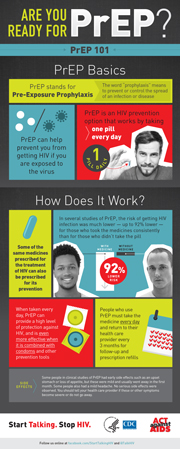
PrEP Literature
- Stopping HIV? The Truvada Revolution. (full length) VICE, June 26, 2015
"Controversy continues to surround the broad uptake of Truvada, but the landscape of safer sex and HIV-prevention changes fundamentally from this point forward, particularly within the gay male community, the population hardest hit by HIV in America. Its ultimate implications for the AIDs epidemic are profound."
- PrEP, B.C. Centre for Excellence in HIV/AIDS Research, 2016
- "PrEP: why are we waiting?" Editorial, The Lancet, Vol. 2, October 2015
- PrEP, U.S. Centers for Disease Control and Prevention, December 2015
- "There's a Drug That Prevents HIV. Let's Use It: An FDA-approved drug can prevent HIV infections, but critics have worried that having such a fallback pill can promote unsafe sex and cause HIV infections to rise. A new study proves them wrong." Alice Park, TIME Magazine, November 2015
- High-altitude PrEP: The birds-eye view of discussions and data in Vancouver. Global Advocacy for HIV Prevention (AVAC), July 22, 2015
- Pre-exposure prophylaxis works – it's time to deliver. The Lancet, Vol 385, April 18, 2015
- "PrEP Implementation Science: State-of-the-Art and Research Agenda," Volume 18, Supplement 3, Journal of the International AIDS Society, 2015
- Pre-exposure prophylaxis (PrEP), Canadian AIDS Treatment Information Exchange, 2015
- PrEP – The Basics, San Francisco AIDS Foundation, 2015
- Treatment as Prevention, Averting HIV and AIDS, January 25, 2015
- "10 things you need to know about the pill to prevent HIV." Julia Belluz, Vox, December 1, 2014
- Access to HIV Prevention and Treatment for Men Who Have Sex with Men: Findings from the 2012 Global Men's Health and Rights Study. The Global Forum on MSM & HIV (MSMGF), 2012
- "Preexposure Prophylaxis for HIV Infection among African Women." Lut Van Damme, M.D. et al, The New England Journal of Medicine, August 2, 2012
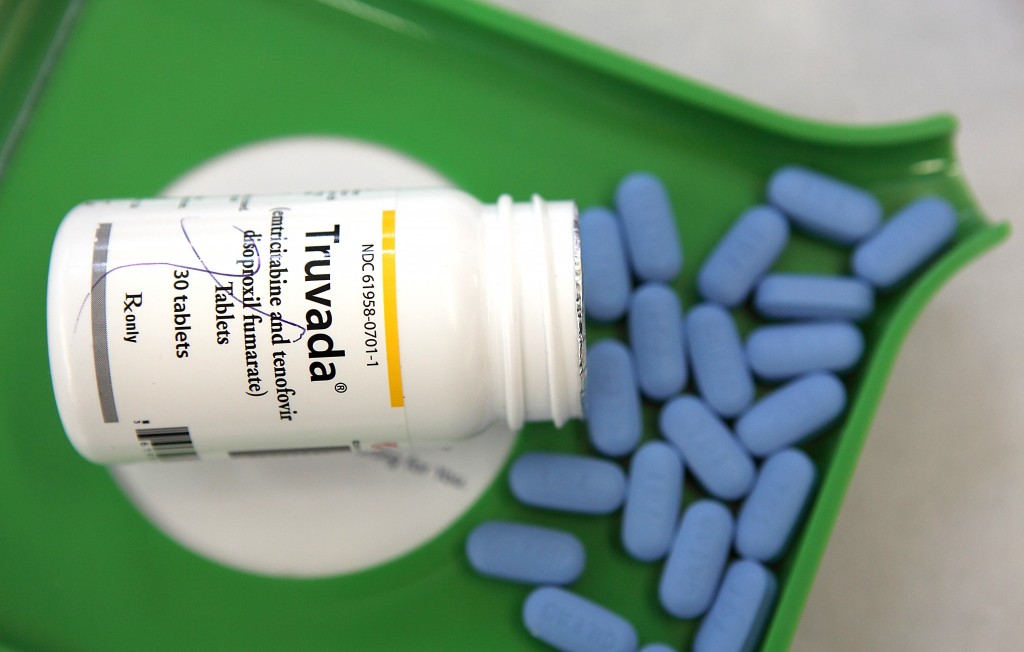
A bottle of antiretroviral drug Truvada
Photo: Justin Sullivan/Getty Images |
|> Contents |
Popular PrEP Promotion
- 8 things you didn't know about Truvada, Daniel Costa-Roberts, PBS, April 12, 2015
On PBS NewsHour Weekend Sunday, we travel to San Francisco, where city public health officials have set an ambitious goal, called "Getting to Zero," to eliminate new HIV infections. One of the main pillars of the plan relies on use of the antiretroviral drug Truvada…
- "PrEP: Why it is important for all of us." Steven Spencer, Star Observer, April 7, 2015
- PrEP Facts Virtual Library, San Francisco AIDS Foundation, 2015
- Pre-Exposure Prophylaxis, Project Inform Videos
- HIV Prevention Just Got Easier: PrEP is a once a day pill that can keep you HIV negative. (prepforsex.org)
- Blue Ribbon Boys, SMSMGF (The Global Forum on MSM and HIV), 2015
- AIDS United Statement on Pre-Exposure Prophylaxis (PrEP), AIDS United Policy Action Centre, November 2014
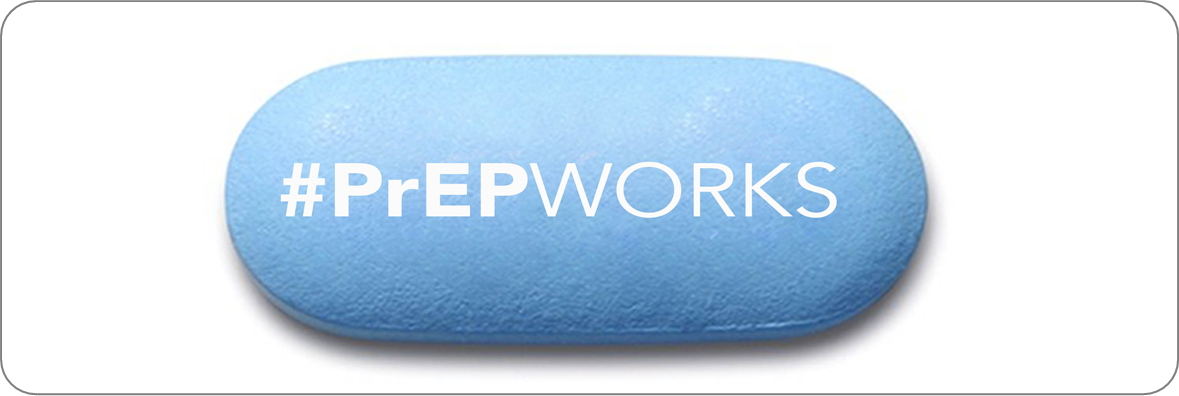
#PrEPWorks Social Media Kit
Banner: AIDS United Policy Action Centre |
|> Contents |
En Français (In French)
- "Le retour en force de la syphilis." France TV Info, 24 mars, 2016
"Alors qu'on la croyait appartenir au passť, la syphilis est en pleine recrudescence : 400 à 500 nouveaux cas sont déclarés chaque année en France. En cause : une augmentation des pratiques sexuelles à risque."
- Position sur les traitements antirétroviraux comme moyen de prévention, COCQ-SIDA, July 25, 2015
- Note du STRASS sur la PrEP en Direction des Travailleur-se-s du Sexe. Syndicat du Travail Sexuel (STRASS), 28 mai, 2014
- "Traitement préventif contre le VIH : en finir avec la dépolitisation." Morgane Merteuil et Thierry Schaffauser, contretemps, 9 novembre, 2014
Morgane Merteuil et Thierry Schaffauser, militant-e-s du Syndicat du travail sexuel (STRASS), reviennent ici sur le débat associé à un nouveau mode de prévention du VIH, et pointent notamment les effets néfastes d'une stratégie de lutte contre le sida dépolitisée.
|> Contents |
Research Tools
|> Contents |
Partnership Information
- Dan Allman, PhD, Assistant Professor, Co-Director
HIV Studies Unit, Dalla Lana School of Public Health, Faculty of the University of Toronto
As a student Dan Allman studied Sociology and Public Health at Universities and Colleges in Canada, Scotland and Spain. Today he is an Assistant Professor at the Dalla Lana School of Public Health, and Co-Director of the HIV Social, Behavioural and Epidemiological Studies Unit. His scholarly work focuses on the social and structural production of risk and well-being, particularly for those considered marginal, vulnerable or peripheral to a society's core. Within Canada Dan has had leading roles in community-based, participatory and collaborative research projects in studies like the Winnipeg Men's Survey, the Ontario BiSex Survey, The Ontario Men's Survey, M-Track, and Male Call Canada. At the University of Toronto Dan teaches a popular undergraduate course in HIV Prevention Research, and a graduate course in Survey Design and Social Research Methods in Public Health.
Academic publications specific to sex work include peer reviewed journal articles focusing on Ethical and Participatory Practices for Marginalized Populations in Biomedical HIV Prevention Trials (2014), PEPFAR's Anti-Prostitution Pledge and Its Implications for Successful HIV Prevention among Organisations Working with Sex Workers (2013) Improving Communication for Good Participatory Practice in Clinical Trials (2011); chapters on male sex work in the books Men Who Sell Sex: Global Perspectives (2015) and Men Who Sell Sex: International Perspectives on Male Prostitution and HIV/AIDS (1998); and the monographs M is for Mutual, A is for Acts: Male Sex Work and AIDS in Canada (1999) and Concepts, Definitions and Models for Community-Based HIV Prevention Research in Canada (1997).
Web: dlsph.utoronto.ca/faculty-profile/dan-allman
- Cheryl Overs, Senior Research Fellow
Michael Kirby Centre For Public Health and Human Rights
Monash University, School of Public Health and Preventive Medicine, Melbourne, Victoria, Australia
Visiting Research Fellow, Sexuality Poverty and Law Programme, Institute of Development Studies, University of Sussex, Brighton, UK
Resumé: oversresume-2014.pdf

Blue Ribbon Boys Campaign
The Global Forum on MSM and HIV |
|
 |
